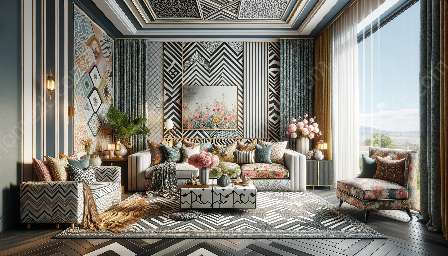Mirrors hold significant cultural value in societies around the world, playing a central role in visual enhancement and decorating. The reflective qualities of mirrors have influenced human behavior, aesthetics, and self-perception for centuries, making them embedded in various aspects of cultural practices.
Visual Enhancement with Mirrors
Mirrors have long been used for visual enhancement, allowing individuals to assess their appearance and make aesthetic decisions. Across different cultures, mirrors have been an essential tool for grooming, self-reflection, and personal presentation. The use of mirrors to enhance one's visual appearance is deeply rooted in cultural norms and standards of beauty.
The art of using mirrors for visual enhancement extends beyond personal grooming and fashion. In many cultures, mirrors play a vital role in ceremonial rituals, such as weddings and coming-of-age ceremonies. The reflective surfaces of mirrors symbolize not only physical attractiveness but also spiritual purity and inner beauty, reinforcing the cultural significance of mirrors in enhancing one's visual presence during important life events.
Mirrors in Decorating
Aside from their practical utility, mirrors are widely utilized in decorating spaces. From ancient palaces to modern homes, mirrors have been employed to create a sense of openness and elegance within interiors. Their reflective nature adds depth, light, and a sense of expansiveness to rooms, making them essential elements of interior design across diverse cultural settings.
In many cultures, mirrors are integrated into traditional architectural and decorative styles to symbolize values such as truth, clarity, and harmony. For instance, in feng shui, a Chinese philosophical system, mirrors are strategically placed to redirect energy flow and create a balanced environment. Similarly, in Indian culture, mirrors are part of traditional art and craft, reflecting the interconnectedness of material and spiritual realms.
Cultural Significance
The cultural significance of mirrors extends beyond their practical utilities, profoundly shaping the perception of self and others within societies. Mirrors serve as a medium through which individuals engage with their own image, contributing to the development of self-identity and social dynamics.
Self-perception influenced by mirrors varies across cultures, influencing beauty standards, expressions of identity, and social interactions. The significance of mirrors in this context highlights the intricate relationship between cultural norms, self-image, and societal expectations.
Impact on Cultural Practices
Throughout history, mirrors have been integrated into various cultural practices, including religious ceremonies, art forms, and social rituals. Their symbolic and functional value has permeated diverse aspects of human expression, contributing to the richness and diversity of global cultures.
The use of mirrors for visual enhancement and decorating embodies a universal human desire for self-expression, beauty, and aesthetic appreciation. By understanding the cultural significance of mirrors, we gain insight into the deep-rooted connections between human societies and the objects that shape their perceptions and rituals.






































